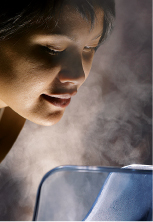Fighting colds & flu
When you come down with the first symptoms of a cold, you can rest and take pain relievers. If the symptoms don't go away you should consult a doctor. Natural remedies can also help to relieve symptoms. Holistic treatments should always accompany a medical diagnosis and treatment.

+ In general, when your symptoms are treated, only if your doctor diagnoses an infection antibiotics should be prescribed. When symptoms become serious, your doctor can take x-rays and other tests to make a more exact diagnosis.
If you have aches, chills and a fever, the best thing to do is to lie down and rest covered up in a warm, well-ventilated room. If the body maintains a fever, it's good to apply a cold washcloth over the face and body, and to rinse off the sweat. It's important to drink plenty of liquids to replace salt and minerals you lose when you sweat. Unlike babies, who should receive immediate medical attention and be administered anti-fever medication and lukewarm baths, adults should consult their physician before taking medication.
ANTIBIOTICS
You should never take antibiotics without a medical prescription. Once you start taking antibiotics it is fundamental to complete the treatment. Always take them for the complete period prescribed by your doctor, even if you start to feel better or if the symptoms go away.
The idea is to avoid getting rid of the symptoms, for your doctor to be able to use them in a proper diagnosis of the illness.
One of the first symptoms of a cold may be excessive thirst. This is a result of the increased calories that your body burns to fight the infection. It's recommended to drink plenty of cold water and to avoid drinking tea, coffee or soft drinks. If you come down with the flu you should rest and treat your symptoms. However, if you don't feel better after 3 or 4 days, you should see a doctor.
A doctor, who can determine whether there are bacteria in the throat, should always treat angina. If the test comes out positive, it's generally treated with antibiotics. Tonsillitis, laryngitis, bronchitis are all infections treated with rest, vapors, and pain relievers, but if symptoms persist for more than 2 days you should see a doctor.
A physician should treat pleurisy. Along with prescribed medication, you should get plenty of rest and drink a lot of fluids. Hot compresses applied to the back and chest can also help to alleviate symptoms and help you to get better. With these illnesses, you should avoid sudden changes of temperature, use disposable tissues and wash your hands often.

COMPLEMENTARY TREATMENTS
- • Yoga.
- • Shiatsu.
- • Reflexology.
- • Hydrotherapy.
- • Using essential oils in aromatherapy.
- • Using medicinal herbs in infusions and inhalations.
- • Nutritional and dietary therapy.


Comment about this article, ask questions, or add new information about this topic: